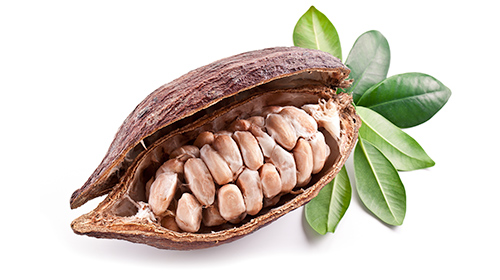Cognition: A significant body of published research has shown that consumption of cocoa flavanols support cognition across a range of ages and study durations. Noteworthy trials range from a single day study in young adults showing improved cognitive performance and reduced ‘mental fatigue’ to a three month trial with baby boomers at Columbia University showing a significant reversal in age related memory loss. Below are publication summaries of clinical studies assessing the impact of cocoa flavanols on cognition:
Jun
2017
Flavonoid intake and cognitive decline over a 10-year period.
American Journal of Epidemiology
In the PAQUID (Personnes Agées Quid) study, the authors prospectively examined flavonoid intake in relation to cognitive function and decline among subjects aged 65 years or older. A total of 1,640 subjects free from dementia at baseline in 1990 and with reliable dietary assessment were reexamined four times over a 10-year period. Cognitive functioning was… Read more »
Mar
2015
Cocoa flavanol consumption improves cognitive function, blood pressure control, and metabolic profile in elderly subjects: the Cocoa, Cognition, and Aging (CoCoA) Study–a randomized controlled trial.
American Journal of Clinical Nutrition
BACKGROUND: Recent evidence has indicated that flavanol consumption may have many health benefits in humans, including improved cognitive activities. OBJECTIVE: The aim was to evaluate the effect of flavanol consumption on cognitive performance in cognitively intact elderly subjects. DESIGN: This was a double-blind, controlled, parallel-arm study conducted in 90 elderly individuals without clinical evidence of… Read more »
Dec
2014
Enhancing dentate gyrus function with dietary flavanols improves cognition in older adults.
Nature Neuroscience
The dentate gyrus (DG) is a region in the hippocampal formation whose function declines in association with human aging and is therefore considered to be a possible source of age-related memory decline. Causal evidence is needed, however, to show that DG-associated memory decline in otherwise healthy elders can be improved by interventions that enhance DG… Read more »
Sep
2012
Benefits in cognitive function, blood pressure, and insulin resistance through cocoa flavanol consumption in elderly subjects with mild cognitive impairment: the Cocoa, Cognition, and Aging (CoCoA) study.
Hypertension
Flavanol consumption is favorably associated with cognitive function. We tested the hypothesis that dietary flavanols might improve cognitive function in subjects with mild cognitive impairment. We conducted a double-blind, parallel arm study in 90 elderly individuals with mild cognitive impairment randomized to consume once daily for 8 weeks a drink containing ≈990 mg (high flavanols),… Read more »
Feb
2012
Steady state visually evoked potential (SSVEP) topography changes associated with cocoa flavanol consumption.
Physiology & Behavior
In a randomized, double-blind placebo controlled trial, 63 middle-aged volunteers aged between 40 and 65 years were administered a daily chocolate drink containing 250 mg or 500 mg cocoa flavanols versus a low cocoa flavanol (placebo) drink over a 30-day period. Participants were tested at baseline as well as at the end of the treatment… Read more »
Jun
2011
Consumption of cocoa flavanols results in an acute improvement in visual and cognitive functions.
Physiology & Behavior
Cocoa flavanols (CF) influence physiological processes in ways that suggest their consumption may improve aspects of neural function, and previous studies have found positive influences of CF on cognitive performance. In this preliminary study we investigated whether visual, as well as cognitive, function is influenced by an acute dose of CF in young adults. We… Read more »
Oct
2010
Consumption of cocoa flavanols results in acute improvements in mood and cognitive performance during sustained mental effort.
Journal of Psychopharmacology
Cocoa flavanols (CF) positively influence physiological processes in ways that suggest their consumption may improve aspects of cognitive function. This study investigated the acute cognitive and subjective effects of CF consumption during sustained mental demand. In this randomized, controlled, double-blinded, balanced, three period crossover trial 30 healthy adults consumed drinks containing 520 mg, 994 mg… Read more »
Apr
2008
Cerebral blood flow response to flavanol-rich cocoa in healthy elderly humans.
Neuropsychiatric Disease and Treatment
BACKGROUND AND PURPOSE: Cerebral ischemia is a common, morbid condition accompanied by cognitive decline. Recent reports on the vascular health benefits of flavanol-containing foods signify a promising approach to the treatment of cerebral ischemia. Our study was designed to investigate the effects of flavanol-rich cocoa (FRC) consumption on cerebral blood flow in older healthy volunteers…. Read more »
Jan
2006
The effect of flavanol-rich cocoa on the fMRI response to a cognitive task in healthy young people.
Journal of Cardiovascular Pharmacology and Therapeutics
Flavanols are the main flavonoids found in cocoa and chocolate, and can be especially abundant in certain cocoas. Research over the past decade has identified flavanols as showing diverse beneficial physiologic and antioxidant effects, particularly in context of vascular function. The present study employed functional magnetic resonance imaging based on blood oxygenation level-dependent (BOLD) contrast… Read more »
Jan
2006
Cocoa flavanols and brain perfusion
Journal of Cardiovascular Pharmacology and Therapeutics
Foods and beverages rich in flavonoids are being heralded as potential preventive agents for a range of pathologic conditions, ranging from hypertension to coronary heart disease to stroke and dementia. We and others have demonstrated that short-term ingestion of cocoa, particularly rich in the subclass of flavonoids known as flavanols, induced a consistent and striking… Read more »

